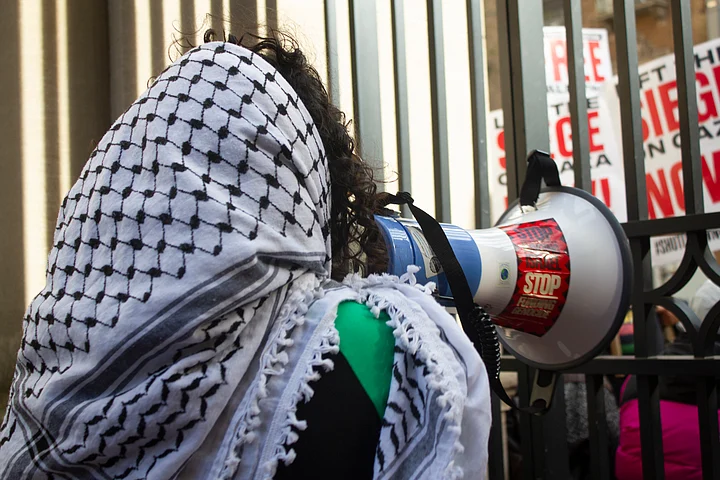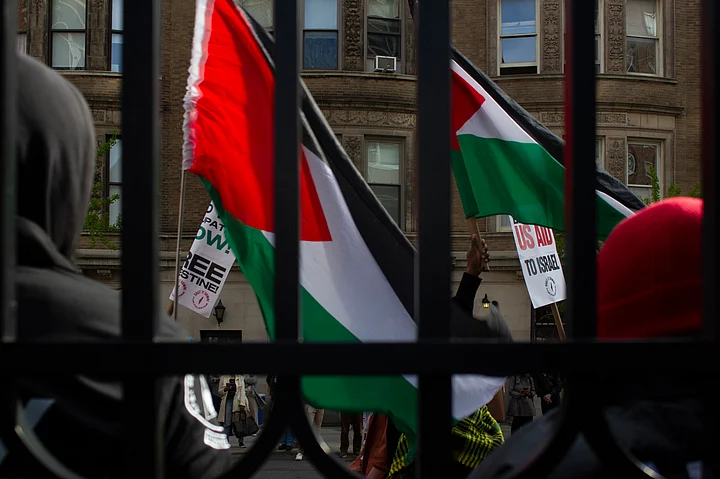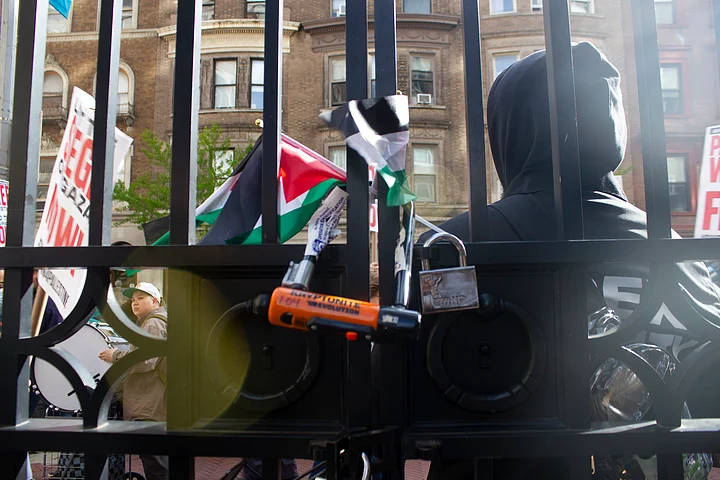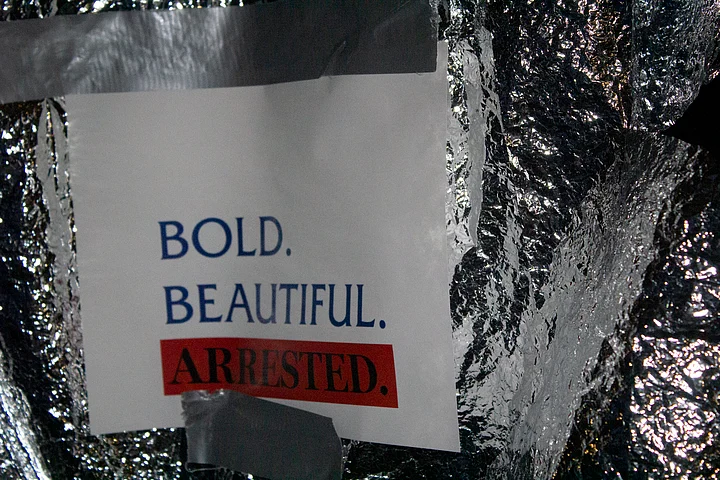Video Editor: Nitin Bisht
“Palestinian solidarity is inevitable and necessary to salvage life, to preserve for a whole generation, and to put an end to this generational trauma, where every side loses,” said Sarah Borus, a Jewish student who has been suspended for supporting the ongoing protests at New York's Columbia University, at a press conference organised by the Columbia chapter of the Jewish Voice for Peace, on Tuesday, 23 April.
Meanwhile, Mahmoud Khalil, a Palestinian student, added, “A lot of the Palestinian students here feel uncomfortable protesting the genocide of their people. We are grateful to everyone on campus for protesting on our behalf.”
Since the beginning of the Israel-Gaza conflict, Columbia University students have been advocating for Palestinian freedom – and calling for the university to divest from Israeli apartheid. Protests had erupted across the university, apart from other, US educational campuses, in the aftermath of Israel bombarding Gaza in retaliation to the 7 October 2023 attack by Hamas.
According to the Gaza Ministry of Health, at least 33,000 people have been killed, with more than 70,000 injured since then. The Israeli government had reported that 1,200 people were killed by Hamas.
Last week, during the early hours of 17 April, the movement gained momentum after an encampment of over 30 tents were set up on the university's South Lawn.
Organised by a coalition of student-led groups, including Columbia University Apartheid Divest, Students for Justice in Palestine, and Jewish Voice for Peace, the site of protests came to be known by 'Gaza Solidarity Encampment'.
What Happened?
The 'Gaza Solidarity Encampment' began the day Columbia University President Minouche Shafik testified at a heated congressional hearing at Capitol Hill about antisemitism on the campus. Shafik faced scrutiny from both Republicans and Democrats.
Students at Columbia University have voiced three main demands –
Divestment from companies doing business in Israel
Disclosure of the university’s investments
Full amnesty for all students and staff who have been suspended, dismissed, fired, or otherwise punished for involvement in the movement
On 18 April, Shafik authorised the New York Police Department (NYPD) to intervene and dismantle the tents on the lawn, resulting in the subsequent arrest of 108 individuals and exacerbating tensions on campus.
“I witnessed the events unfold on the night of 17 April when the administration began to issue threats. Around 9 pm, the university delivered an ultimatum, insisting that students vacate the premises before the deadline. It was an incredibly impactful display of solidarity,” said a Columbia University student protester, who wished to remain anonymous for the fear of being doxed.
One of the arrested students said, “They (NYPD) told us that we were officially under arrest. I was zipped tight. I still got marks on my wrist the next day.”
“Many of the students who have been suspended are denied their food, housing, and access to their education because of their suspension status,” the student alleged.
In the afternoon of 18 April, Shafik emailed the students, "Through direct conversations and in writing, the university provided multiple notices of these violations, including a written warning at 7:15 pm on Wednesday [17 April] notifying students who remained in the encampment as of 9 pm that they would face suspension pending investigation."
However, the pro-Palestinian student groups then occupied the West side of the lawn and adamantly refused to vacate the area. More students joined the protests within a few hours. The lawn was once again adorned with posters, tarpaulin sheets, blankets, and food, although tents were conspicuously absent.
Following three days of makeshift arrangements, the university sanctioned the erection of tents on the lawns. Since then, an increasing number of students have joined the protest.
On 21 April, the university granted permission for the erection of tents once again.
This time, the turnout was even larger, with more tents being set up. As of now, there are over 150 tents scattered across the university lawns.
Students from diverse backgrounds sang songs of freedom and chanted slogans like “from the river to the sea, Palestine will be free”, “disclose, divest, we will not stop, we will not rest” “Minouche Shafik, you can’t hide, you’re supporting genocide.”
What Shafik Said to Congress
Over the past six months, the campus had witnessed dozens of protests, instances of harassment involving Palestinian and Jewish students, and significant media attention focused on the university's management of these issues.
Last November, the Columbia administration suspended the university chapters of Students for Justice in Palestine and Jewish Voice for Peace, both of which have been leading pro-Palestine demonstrations on campus.
The Columbia administration said in a statement that the two groups repeatedly violated the university’s policies.
On 19 January, two pro-Palestinian student protesters were allegedly attacked by a foul-smelling, hazardous chemical agent on the campus. President Shafik had been quiet on the incident, and no action was taken against the students who attacked.
On 22 January, the university administration stated in an email sent to students and other stakeholders: "...the alleged perpetrators identified to the University were immediately banned from campus while the law enforcement investigation proceeds."
On 3 April, the university suspended four students and issued them a 24-hour-long notice of eviction from university housing. According to student newspaper Columbia Spectator, this action was taken in response to their alleged involvement in an unauthorised event titled 'Resistance 101', which took place on 24 March.
In a hearing, the Congress, chaired by congresswoman Virginia Foxx, said that “some of the worst cases of antisemitic assaults, harassment, and vandalism on campus have occurred at Columbia University.”
Shafik stated that she took significant steps to address the antisemitism on the campus in the last six months. “We have suspended two student groups for non-compliance, more than a dozen individual students and we discipline faculty members,” she said.
She added that some comments made at the protests were “unsettling and frightening.”
Shafik isn't the first university president to face scrutiny. In December, leaders of Harvard, MIT, and the University of Pennsylvania testified before Congress on antisemitism.
Following these hearings, University of Pennsylvania President Liz Magill, Penn's board chairman Scott Bok, and Harvard President Claudine resigned.
According to the Axios publication, during their hearing before the House Committee on Education, Gay and Magill defended their handling of antisemitic incidents, prompting bipartisan criticism and calls for resignation, including from the White House. Donors threatened to withdraw funding, influential alumni demanded resignations, and petitions garnered thousands of signatures.
Teachers Stand in Solidarity
The protests have garnered support from non-university members too, who huddled outside the locked gates in support of Palestine and the students who were arrested.
Suchitra Vijayan, professor at Human Rights Oral History and Documentation Center in Columbia University, said, “No campus should invite the violent NYPD to arrest students. Also, given the fact that the university administration has really not taken the right actions to protect students, while there are concerns of anti-semitism, there's been absolutely nothing done on the Islamophobia, the anti-Palestinian sentiment that's been there.”
On 22 April, coinciding with the first night of Passover, students at the encampment hosted the Jewish festival.
Around 100 students and faculty members gathered around the tents, feasting on kosher food such as boxes of matzo. Some of the students wore keffiyehs to show solidarity with Palestine, while others sported Jewish skullcaps.
Jared, a Jewish student at Columbia University, said, “Ever since, I think the genocide in Palestine and Gaza began, I have been attending these protests to show my support as a Jewish person and stand with the people of Palestine and the Palestinian people here, to try and help dispel the myths of anti-Semitism on campus, to be very visibly Jewish as I am there in support of Palestine."
While the protests within the campus remain peaceful, the school's perimeter is now under constant surveillance by the NYPD.
Most entrances to the main campus have been locked and iron barricades surround the walls of the university. Security measures have been intensified, restricting access solely to students, faculty, and alumni who possess a valid Columbia University ID.
The affiliates could previously simply tap their ID for entry; however, the new protocol requires security personnel to verify the identity on the ID before granting access.
Outside the campus both pro-Israeli and pro-Palestinian protests have taken place, with some instances escalating into violence, resulting in clashes with NYPD.
As the protest gained momentum, Palestinian journalist Motaz Azaiza, notable Palestinian activists Mohammed El-Kurd, along with actress and activist Indya Moore, and independent US presidential candidate Cornel West, political scientist focused on Israel-Palestine Norman Finkelstein joined the student protest.
The protests have received criticisms from several politicians and government officials.
New York City mayor Eric Adams said in a statement, "I am horrified and disgusted with the antisemitism being spewed at and around the Columbia University campus.”
Three congressmen Rep Anthony D’Esposito, Congressman Mike Lawler, and Bruce Blakeman held a press conference right outside the university and demanded the resignation of President Shafik. “Shame on you. Shame on you for not protecting these students. Shame on you for letting these protesters and these thugs take over your university. Hey, we are not gonna let that happen,” Congressman Bruce Blakeman said while addressing the press conference outside Columbia University.
On Sunday, 21 April, the Columbia faculty and students received an email which stated that the classes on Monday will be remote, followed by another email that said the remainder of the semester would be conducted in a hybrid format.
“We are writing to share guidelines for teaching for the remainder of the semester. Safety is our highest priority as we strive to support our students’ learning and all the required academic operations,” the email read.
Amid the ongoing protests at Columbia University, more universities, including Yale, NYU, Northwestern, Brown, Harvard, MIT, have joined to show solidarity for the Columbia students.
The students from these universities staged walkouts on their campuses. As the protests intensified, over 100 pro-Palestinian protesters were arrested at NYU, and around 45 protesters were charged with misdemeanor at Yale University.
As of 24 April, Columbia University administration is in closed-door negotiations with the student organisers to discuss the Gaza Solidarity Encampment on campus.
(Arshi Qureshi and Uzma Afreen are students at Columbia University, New York.)
(At The Quint, we question everything. Play an active role in shaping our journalism by becoming a member today.)



